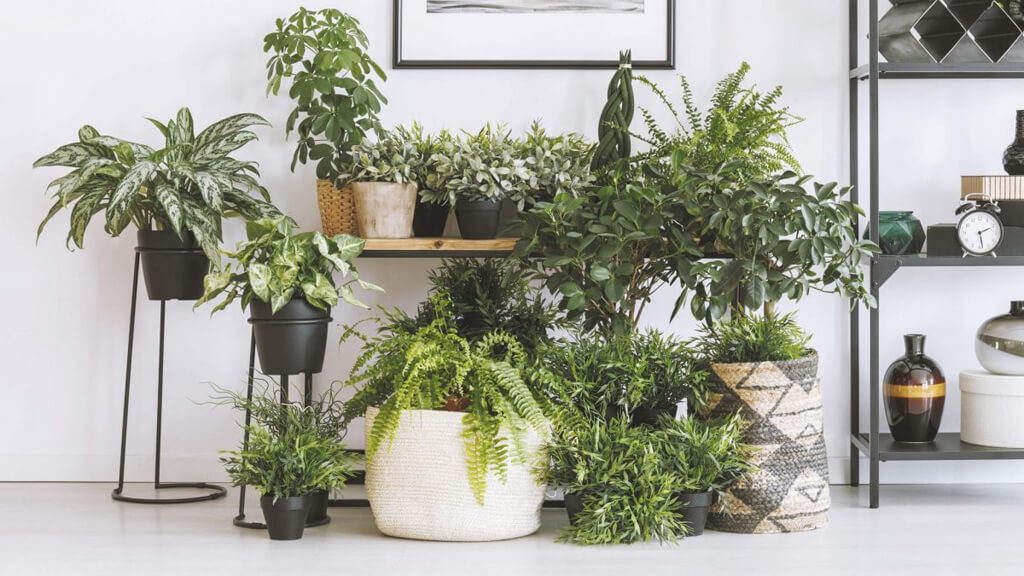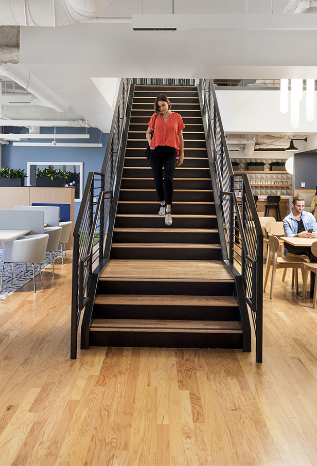More and more organisations are choosing to bring plants into the office, whether it’s small cacti on a desk, fresh flowers in the kitchen or potted trees in relaxation areas. But plants are so much more than just an interior design feature, and can provide several benefits to both your office space and your employees.
In this article, we’ll help you understand the benefits of having plants in the office space and which plants you can invest in to experience these benefits for yourself.
What are the benefits of plants in the office?
Luscious office greenery has become synonymous with the modern, trendy workspace, bringing the outdoors in and adding a splash of colour to otherwise dull or whitewashed environments. While incorporating colour pops and nature can help to improve the aesthetic of a building, here are the other benefits to having plants in the office.
Increased productivity
Driving productivity is a key focus for many businesses, but few know that including plants in the office can help to increase productivity. A study by Dr Chris Knight found that workers are 15% more productive when there are houseplants in view.
Filling your office space with interesting items to look at, as opposed to drab and plain walls with no character, gives your employees something to engage with. This is important because employees who engage with their surroundings are better workers, delivering greater output and an improved focus.
RELATED: How Office Layout Impacts Productivity
Reduced stress
While many people take to gardening as a stress buster, having plants in the office can produce a similar impact. A study published in the Journal of Physiological Anthropology concluded that plants in your home or office space can make you feel more comfortable, soothed and natural, with active interaction reducing physiological and psychological stress when compared with mental work.
Colour can also have an impact on workplace stress, with bright colours promoting positivity and happiness. The colour green is strongly associated with nature, which is known to reduce stress and promote feelings of calm and tranquillity. Introducing more of the colour green by adding plenty of houseplants is a fun and alternative way to reduce stress.
Reduced sickness and absence rates
Many different plants have what some would describe as ‘healing powers’, and incorporating plants into your office environment can help to significantly reduce sickness and absence rates.
This can be done in two ways. The first is almost instant and involves plants filtering toxins from an environment, particularly one with poor ventilation. This filtration can help to reduce what is known as “sick building syndrome” which can produce headaches, nausea and flu-like symptoms.
The second way plants reduce sickness is their association to nature, peace and calmness which helps to improve a person’s mental wellbeing and therefore their overall health. A study found that workers with natural elements in their office reported a 15% higher wellbeing score than those with no plants in the office.
Better air quality
As mentioned before, plants have natural air filtration properties that can help to improve air quality and ensure clean air is circulating around the office. Indoor plants have been found to reduce carbon dioxide levels by around 10% in air-conditioned offices, and by about 25% in buildings with no air conditioning.
Reduced noise levels
With more of us working from open-plan shared offices and coworking spaces, noise levels have become something we’re all familiar with. Plants are a great way of reducing noise levels because they absorb sound, reduce echoes and help to minimise distractions. Placing a few large houseplants around the edges or corners of your office is the best way to use them to your advantage.
RELATED: How to Improve the Office Environment
Boosted creativity
We all know the benefits of nature in the real world, but did you know that looking at plants can help your brain function differently and make you feel more relaxed, focused and creative? A study conducted by Human Spaces found that employees whose offices included natural elements scored 15% higher for creativity than those without.
What plants do well in office lighting?
Generally speaking, any type of plant will help you to experience some of the benefits outlined above, but you’ll need to consider your office environment before you decide on the exact plants you’re going to include. Some thrive in different conditions to others and some require more maintenance. It’s important to choose plants that suit your office space, especially if you don’t want to be replacing them every few months when they die!
Plants that do well in office lighting are typically those that don’t require much natural light and don’t need to be placed in direct sunlight – Chinese Evergreen and Cast Iron plants are great examples of plants that thrive in a variety of conditions and also look great in any office.
If you’re looking for the best office plants with no windows to give them natural light, peace lilies are a good option. They are even plants that do well in office fluorescent light.
When considering low maintenance plants, you might automatically think about succulents or cacti. But can succulents grow in office light? Yes is the answer. Succulents are pretty hardy plants and can survive in a range of different conditions. Just be sure to provide some lighting and a well-draining potting mix.
If you’ve got a few plant species in mind, but you’re wondering how to decorate your office with plants, it’s a good idea to first start by placing them in locations that best suit their natural growing conditions. You can then see what looks good and move anything that doesn’t quite look right. The beauty of potted plants is the ability to move them as necessary, ensuring they get exactly what they need while brightening up any office space.
Many of our office spaces can be tailored to suit your design requirements, enabling you to move around the furnishings to ensure you can fit plenty of plants around the place. Find your perfect office space today.

